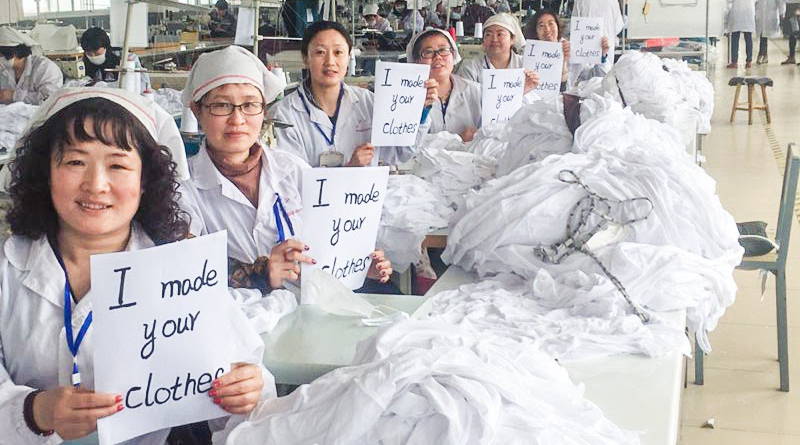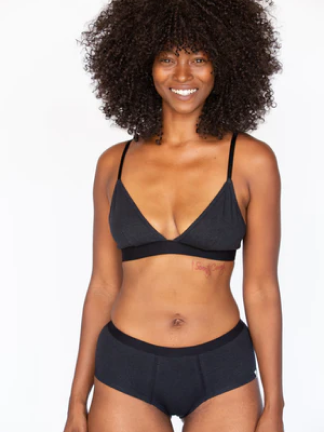
Hemp In China: Why China Leads The World In Hemp Textiles
|
If you're not happy with your first pair of underwear after trying it on, let us know.
We'll send a new size or color, or give you a refund. No returns needed.

Katie Lemon
|
Today’s most sustainable companies around the globe rely on Chinese hemp to produce their sustainable fabrics and textiles. This includes 100% of hemp fabric suppliers in the US, large retail operations, as well as small businesses using hemp fabrics in their clothing and accessory lines. No other country in the world can come close to the hemp yarn and hemp textile production scale of China.
Here at WAMA, we’re proud to work with ethical manufacturers of hemp in China to make our organic underwear, from hemp underwear styles like men’s briefs to women’s bikini’s, and some wonderfully comfortable styles in between.
Let’s dive in a bit more to understand why China leads the world in hemp textiles, and why WAMA trusts hemp fabric produced and manufactured in China.
WAMA and other sustainable brands across the globe source their hemp textiles from China because of the sheer amount of hemp that China produces and the quality they can achieve in their hemp fabrics. No other country can come close to hemp textiles made in China.
China controls over one-third of the hemp market globally and within that market, the largest share goes to hemp textile production. China has been producing hemp clothing for literally thousands of years, so this really comes as no surprise.
For years, China has harvested 70% of the hemp grown in the entire world, followed by Canada, and then the US. The government temporarily banned the plant in 1985, so the modern hemp industry in China dates back to 2010. Just in that decade, China has become the largest producer of hemp worldwide.
With hemp as one of the most sustainable fabrics in the world, China is the place where you can find it. Why miss out on using the most sustainable fabric just because there is some sort of preconceived notion that China is a bad place to source fabric from? This biased opinion simply isn’t based on fact.
Although hemp is legal in the states, there are currently no efficient production processes to manufacture hemp yarn into hemp fabric here. Years of testing various processes would need to be implemented before coming close to what China can produce. Therefore, no stateside manufacturer is in a position to produce the same quality of textiles as China can.
For sustainable brands like WAMA, fabric quality is of the utmost importance. It is a key factor to our business model that the hemp fabric is durable, and is guaranteed to last for years. By utilizing strong manufacturing techniques, Chinese hemp fabric is built to last for a long time.
WAMA isn’t the only brand to recognize that China knows what it's doing when it comes to hemp fabric production. This is why all eco-friendly brands in the US source their hemp fabric from China: because it’s actually the most sustainable option available.
Here are just a few brands that ethically source their hemp textiles from China:
In addition to these brands listed above, 100% of all hemp fabric suppliers in the US source their hemp fabrics from China. If you think this is wrong, please comment below with a link to a hemp fabric supplier in the US who sources their fabric from anywhere but China and correct us.
As a sustainable brand here in the United States, WAMA is proud to source and manufacture our underwear in China. For those that say, “just make it in America,” there are a few big reasons why China is the most sustainable and ethical answer.
Since hemp fabric is sourced from China, no matter where a company chooses to manufacture, they would still likely incur high shipping costs and a large carbon footprint. Why transport this material from country to country when you can just grow hemp, develop hemp fabric, and construct the hemp clothing - all in China? This would greatly eliminate any unnecessary emissions and keep sustainable brands in line with keeping the planet clean and unharmed.
In order to keep a small carbon footprint, it’s imperative to work with factories in China to create a reliable product with high standards - from one country who knows how to do it well!
The truth is that “made in the US” is no better than “made in China,” and there is no infrastructure placed in the US to move forward with local production. When it comes to factory working conditions, "made in the US" can often be worse.
It’s beyond unfortunate, but plenty of US factories have a history of mistreating and underpaying undocumented workers and not providing safe work environments. While you should definitely consider the ethics behind business practices no matter where you’re buying clothes from, plenty of companies in China have made moves to treat employees fairly and ensure safe work environments.
It’s easy to assume that “made in the US” is best. But that’s actually an unfair assumption, erasing the fact that all human beings are worthy of fair wages and ethical treatment, regardless of their country of origin or ethnicity.
Not only would manufacturing hemp in the US increase carbon emissions, but it would also cause a massive spike in retail prices. US living wages are higher, and so is the overall cost of production.
This ripple effect would make sustainable hemp products much less accessible to consumers. Hemp is already an expensive material to begin with. It’s not as widely used as other traditional fabrics like cotton and synthetic materials, so there’s a premium on it. It’s our goal to make hemp, the world's most sustainable fabric, affordable to the masses.
Transparency is super important to brands that are truly sustainable. That's why WAMA Underwear founder, Shakib Nassiri, went to the biggest hemp yarn supplier in Shanxi, China and visited Qingdao, China as well to visit with hemp fabric suppliers.
While he was able to directly see how the hemp in Chinese manufacturing is handled, Shakib also saw first hand that ethical processes were instilled in the factories.
In addition, WAMA has a permanent team member based in China to oversee everything. By ensuring our presence overseas, our company can audit our factories easier and have better communication with our partners.
Chinese manufacturing is no longer the world's cheapest manufacturing hub. There are many countries that manufacture for much cheaper than China like India, Bangladesh, Vietnam, and many more.
The reason why China still has a big percentage of the world's clothing manufacturing is because of its infrastructure and advancement of its processes. The US doesn’t even come close to the infrastructure that China has in terms of clothing manufacturing.
It’s much harder to find suppliers in the US and other countries. Where China has accessible resources like Alibaba to locate manufacturers and fabric suppliers, the same can’t be said for other countries.
Many ask us to source our hemp fabric from a different country than China. But there is no other country in the world that can produce the same hemp blend fabric at this quality. We’ve checked and it just doesn't exist. But if you have found one, please comment below and we promise to look into it.
It’s easy to assume the US has the best practices in manufacturing and production. Sadly, this simply isn’t true. Before you write off goods made in China, take a closer look at the line of production to see what’s really going on. Here are the biggest reasons why China leads the world in hemp textiles and clothing manufacturing:
Ethical business practices have been implemented here at WAMA to ensure employees are treated fairly, no matter what country they live in. We’re proud to work with factories that manufacture hemp in China to make the whole world a better, more sustainable place. All of our products are made with Chinese hemp in Chinese factories that treat employees ethically—from our hemp thongs to our hemp boxers.
Were you surprised to learn why China is the most sustainable option for hemp manufacturing? Let me know your thoughts in the comments below!
Get updates on restocks, new color and size releases, and upcoming product launches. You’ll also get a 15% discount on your first order of hemp underwear.








